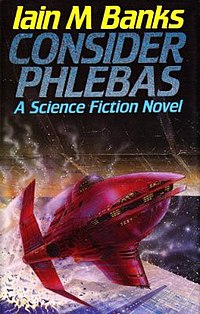 I thought I’d begin a series of posts about books that have influenced me, so I’m going to start with Iain M. Banks’ Consider Phlebas, his first science fiction novel which came out in 1984 after he’d established himself as a reputed literary author with classics such as The Wasp Factory, Walking on Glass and The Bridge.
I thought I’d begin a series of posts about books that have influenced me, so I’m going to start with Iain M. Banks’ Consider Phlebas, his first science fiction novel which came out in 1984 after he’d established himself as a reputed literary author with classics such as The Wasp Factory, Walking on Glass and The Bridge.A space opera with fast paced action, I was blown away by the scope and ideas of this novel. Although I didn’t think about it much at the time when I first read it (early 1990s) it is one of the first new wave space operas that bridged the gap between old style science fiction where computers were isolated machines that couldn’t do much more than a human could, such as those in a Larry Niven or Isaac Asimov novel, and the cyberpunk movement that exploded out of the 1980s where the whole genre became a playground for ‘grey’ characters, flawed and morally ambiguous characters, as opposed to easily defined good guys and bad guys of the past.
I was drawn by the elegant writing style, the detailed characters especially the protagonist Bora Horza Gobuchul who tries to do the right thing by everyone all the time, but just keeps making a mess of everything he touches, and the rich detail of artificial worlds and bizarre cultures and alien species.
Horza is on a mission during war time, when conflict ravages the entire galaxy reminding me of Star Wars, but in a setting that felt so much more realistic and based more squarely on hard science. I was also drawn by Banks’ most famous contribution to the science fiction canon, the Culture, a vast interstellar utopian society where there are no rules and anything anyone wants is possible, and yet an society that felt compelled to meddle with the affairs of governments and species less civilised than their own.
Banks went on to explore this same setting in future novels such as The Player of Games, Use of Weapons, Excession, Matter and others. I’ve read the entire series but I’ve always been drawn back to Consider Phlebas, partially because it was the first one I read, but mostly because of its vision. It is one of the great space opera novels of the Twentieth Century.
